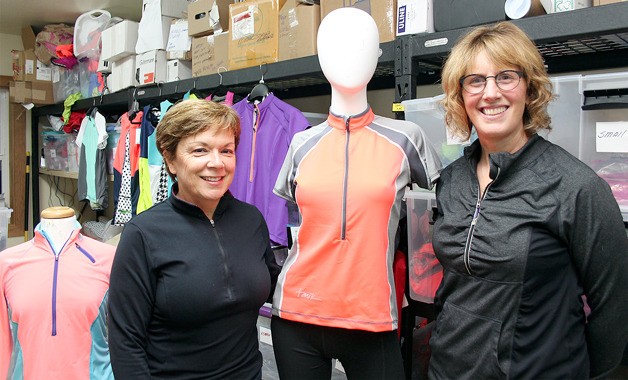When Lisa McDermott and Mary Dettrich first began cycling, they were at a loss for finding a good fit.
The bikes themselves were easy enough to figure out, but the attire — jerseys, shorts, arm sleeves — left them wondering if something better existed. It didn’t, so they created that better fit themselves three years ago, launching Tonik, a women’s cycling clothing line the two women describe as part of the growing market for “athleisure” similar to Lululemon. 
“Tonik” was chosen as a name in reference to the Old World use of tonics as a solution to myriad ailments. Their company based in the unincorporated Langley area carried with it a simple slogan: “Real jerseys for real women.”
“It’s all about the fit,” McDermott said in Tonik’s literal garage office — a long, narrow lofted room above the road-level car port. There is enough space for dozens of bins of jerseys, socks and sleeves, a few desks for their laptops, a printer, a Keurig coffee maker, and a pair of mannequins.
Getting the fit right for all body types was their initial motivation for jumping out of nearly two decades of being busy stay-at-home mothers. Both left working careers almost 20 years ago to tend to their children and families. They, like many women in the United States of America, are turning to cycling as a healthy, low-impact physical activity. According to market research firm NPD Group’s Sports and Leisure Trends Division, the past year’s sales of women-specific bicycle products totaled $468 million in May 2015 and increased 5.1 percent over the same period ending May 2014.
“We’re really passionate about getting more women on bikes,” Dettrich said.
With their children grown and out of their homes, and a sudden surplus of time, they joined a cycling group through Island Athletic Club which sparked their quest for a jersey they wouldn’t feel self-conscious wearing. Most cycling jerseys, they said, are designed for peak bike athletes, not a 60-year-old mother of two or “real women.”
“Apparel may seem silly,” McDermott said. “But it’s important to feel like you fit in. There are lots of body types.”
“When you’re thinking about those things, it impacts every pedal you make,” she later added.
Their vision and company has found a customer base. Reviews through Yotpo on the Tonik Facebook page average five-out-of-five stars through 72 ratings.
The women declined to say what their earnings were or how many sales they’ve made, but said the company has grown 30 percent year over year since launching in 2012. They have yet to turn a profit, but are hustling to enter more bike shops and hope to break through into some large retail chains soon.
Conventional wisdom is that five years are needed before a business sees returns on investments. Both women laughed when they said this, adding that they have found this to be frustratingly true. Considering neither had any experience in manufacturing, clothing design or business management, their success thus far is reason to celebrate for McDermott and Dettrich.
To date, their lines are found in more than 20 stores across the country. Some nearby shops include Gregg’s Cycles in Seattle and Snohomish Bicycles. Team Estrogen, an online retailer, has been one of the biggest boons for Tonik.
Putting gear in retail spaces is relatively new for the company. Previously the owners hit the pavement as owner-promoters, traveling to races and bike shows across the United States to tout their tops, socks and sleeves. Being active in the bike world, pursuing customers and getting their lines in front of cyclists has proven to be the difference maker for Dettrich and McDermott.
Through the summer months, they travel at least once a month to a race or event, set up a booth and promote their wares. Their production schedule has started earlier each year, they said, they are now planning to attend their first event in January.
Customer service is another hallmark for Tonik. Each delivery made through the company’s website is accompanied by a handwritten note on a postcard from either woman. They engage with their customers online, reposting images of women wearing their clothes on rides both leisure and competition. 
“I hope we never lose that,” McDermott said of their emphasis on “exceptional” customer service and engagement.
Added Dettrich: “We want to be the strong name in the women’s athleisure line.”
Tonik’s apparel ranges from $20 for arm sleeves to $97 for jersey tops in a variety of patterns. The Canadian manufactured apparel lasts for years, the owners said. McDermott has one of the original tops that she rides in regularly — though not as often as she’d like, she admits — and has yet to see signs of degradation.
“They stay true to their shape,” she said.
“In our business model, it’s not ideal,” she laughed, noting that it would have made more sense to get people to buy their attire more regularly.
With potential major growth on the horizon, their goal is to continue to expand and serve women of all body types who want to bike. One day, they want to hire others to do their jobs, which they laughingly said was equivalent to 20 people each, and begin an outreach program to encourage more female cyclists.
For now, they will stay busy promoting Tonik at races and shows, writing handwritten notes and knowing that they created the right fit for themselves and thousands of other women.


